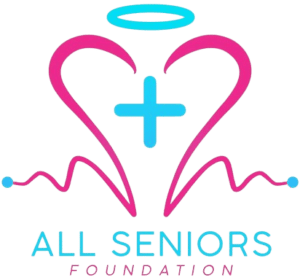The All Seniors Foundation’s initiative to connect senior citizens in Los Angeles with free hospice care is a significant service, especially for those facing life-limiting illnesses.
Hospice services aim to ensure that patients are as comfortable and supported as possible, addressing not only their physical needs but also offering emotional, social, and spiritual support to both the patients and their families.
Book an Appointment
Situations for Seeking Free Hospice Care
- Terminal Illness Diagnosis: Seniors with a prognosis of 6 months or less if the illness follows its usual course.
- Quality of Life Focus: When the focus shifts from curative treatments to comfort and quality of life.
- Advanced Chronic Illnesses: Such as advanced heart disease, COPD, cancer, Alzheimer’s, and kidney failure.
- Repeated Hospitalizations: Frequent hospital visits or deteriorating condition despite treatment.
- Desire for Home-Based Care: Preference to spend final days in a familiar, comfortable setting with family.
Symptoms Associated with Hospice Care
- Pain and Discomfort: Varying levels of pain that require management.
- Breathing Difficulties: Shortness of breath or labored breathing.
- Fatigue and Weakness: Extreme tiredness impacting daily activities.
- Digestive Issues: Nausea, vomiting, constipation, or loss of appetite.
- Cognitive Changes: Confusion, delirium, or significant memory problems.
- Emotional and Psychological Distress: Anxiety, depression, or spiritual/existential distress.
Common Hospice Care Treatments and Their Targets
- Pain Management: Opioids, NSAIDs to alleviate pain from cancer, arthritis, etc.
- Respiratory Support: Oxygen therapy, bronchodilators for COPD, lung diseases.
- Nutritional Support: Dietary adjustments, feeding assistance for appetite loss.
- Hydration Therapy: IV fluids or subcutaneous hydration for dehydration.
- Wound Care: Dressings, antibiotics for bedsores, ulcers.
- Medication Management: Adjusting medications for heart failure, diabetes.
- Physical Therapy: Gentle exercises for mobility and comfort.
- Psychological Support: Counseling for depression, anxiety.
- Spiritual Care: Chaplain services for existential crises.
- Family Support: Guidance and counseling for family members.
Cost Savings and Health Outcomes Benefits
- Reduction in Medical Costs: Free hospice care relieves the financial burden of expensive end-of-life care, including hospital stays, costly treatments, and medication.
- Improved Quality of Life: Focus on comfort and symptom management enhances the quality of remaining life.
- Emotional and Psychological Relief: Reduces stress, anxiety, and depression in patients and families.
- Reduced Hospitalizations: Decreased need for emergency or frequent hospital visits.
- Family Support: Family caregivers receive guidance and support, reducing their emotional and physical burden.
- Patient Autonomy: Respects the patient’s wishes in end-of-life care decisions.
Here’s a detailed explanation of various aspects of this service:
Medical Care
1. Pain Management:
- Medication to relieve pain
Non-pharmacological therapies
2. Symptom Control:
- Managing symptoms like nausea, shortness of breath, anxiety
Adjusting care plans as needed
Nursing Services
3. Skilled Nursing Care:
- Monitoring vital signs
Administering medications
Wound care
4. 24/7 On-Call Support:
- Immediate assistance and care
Addressing concerns or emergencies
Counseling and Emotional Support
5. Psychosocial Support:
- Emotional support for patients and families
Coping strategies
6. Spiritual Counseling:
- Addressing spiritual concerns
Providing comfort through spiritual practices
7. Bereavement Support:
- Grief counseling
Support groups for families
Personal Care
8. Personal Care Assistance:
- Help with bathing, dressing, grooming
Assisting with toileting and incontinence
9. Homemaker Services:
- Light housekeeping
Meal preparation
Therapies
10. Physical Therapy:
- Enhancing comfort through positioning
Gentle exercises to relieve discomfort
11. Occupational Therapy:
- Adapting environment to enhance comfort
Assisting in performing daily activities
12. Speech Therapy:
- Communication assistance
Swallowing support
Social Services
13. Social Work:
- Providing resources and support
Assistance with end-of-life planning
14. Volunteer Support:
- Companionship
Respite for families
Supplementary Services
15. Dietary Counseling:
- Nutritional guidance to manage symptoms
Customized dietary plans
16. Respite Care:
- Temporary relief for caregivers
Short-term care options
17. Complementary Therapies:
- Music therapy
Pet therapy
Art therapy
End-of-Life Planning
18. Advanced Care Planning:
- Assistance with living wills
Discussing wishes for end-of-life care
19. Funeral Planning Support:
- Guidance on funeral arrangements
Support through the planning process
Medication and Equipment
20. Medication Provision:
- Supplying medications for symptom control
Adjusting medications as needed
21. Medical Equipment:
- Providing beds, wheelchairs, walkers
Supplying necessary medical devices
Conclusion
Free hospice care, like that provided by All Seniors Foundation in Los Angeles, offers a compassionate and cost-effective approach to end-of-life care for senior citizens. It not only addresses the physical symptoms of terminal illnesses but also provides much-needed emotional, psychological, and spiritual support to both patients and their families. This holistic care approach significantly improves the quality of life during the final days, while also providing substantial cost savings in healthcare.

